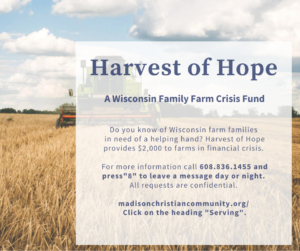By Joy Kirkpatrick and Roger T. Williams
Farming has always been an unpredictable venture and not for the faint of heart. Beginning in 2015, several factors converged to negatively affect the profit margins of most Wisconsin farm enterprises and these tight margins continued through 2019. However, dairy prices were rebounding, and the forecast looked hopeful at the beginning of 2020. Then COVID-19 hit and disrupted the demand for US commodities in other countries and the US supply chain and forced many to dispose of rather than sell their commodities. This series of events has put some farmers in precarious financial positions.
The Harvest of Hope provides financial help and hope to Wisconsin farm families to help address common farm financial problems: power cut-offs or impending power cut-offs, medical or veterinary bills, house or barn fires, feed for cattle, machinery repair, farm accidents, supplies for spring planning, weather events (floods, drought, frost, hail, building damage due to snow-load), or putting food on the table or fuel in the fuel tank. In the past the fund has provided gifts of up to $1,500 to help address these or similar situations. Due to the COVID-19 pandemic, Harvest of Hope has temporarily increased this to $2,000 per family.
Since its beginnings in 1986 Harvest of Hope has distributed more than $1.14 million to Wisconsin farm families though a total of 1,705 grants. The Harvest of Hope Fund uses five guiding principles when making grant decisions to farm families:
- Keep Wisconsin family farms in the hands of family farmers
- Respond to farm families in difficult situations that could lead to disaster
- Respond as quickly as possible, usually in two to five days
- Especially sensitive to needs of farm families with small children
- Link farm families with local resources for financial or management assistance
This 5th guiding principle requires the farm family work with one of three advisors: either a University of Wisconsin – Madison Division of Extension educator, a Technical College Farm Business Management Instructor or a Farm Advisor with the Wisconsin Department of Agriculture, Trade and Consumer Protection’s Farm Center. An advisor is asked to describe:
- Their relationship with the farm family
- The current farm/family situation
- The family’s plan for improving their situation in the future.
The fund was created by and is still supported by the Madison Christian Community, an ecumenical Christian community on the west side of Madison. No religious or church community affiliation is asked or required to receive a grant. The Harvest of Hope Fund information and application materials can be found at www.madisonchristiancommunity.org click on the “serving” header, or you can click here for the direct link to the Harvest of Hope Fund page. The Application Form and Financial Planning Statement can be found on the page. Both an Application Form and a Financial Planning Statement from an advisor must be submitted for the board to review and act on the request.
Questions can be directed to this number: (608) 836-1455 and press 8; your call will likely go to a voicemail which allows questions to be left any time of day. Please provide the reason for the call and your complete name, address and phone number and someone will respond as quickly as possible.

